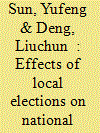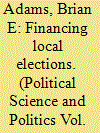| Srl | Item |
| 1 |
ID:
090964


|
|
|
|
|
| Publication |
2009.
|
| Summary/Abstract |
It is widely accepted that local elections in Korea are dominated by national issues, such as punishing the president's party. However, the degree to which local issues matter in Korea's local elections has thus far not been subjected to empirical scrutiny. To fill this void and explain the failures of the president's party more fully, this paper tested two sets of hypotheses. First, it estimated the relative importance of national and local issues-the president's popularity and the governor's or mayor's popularity-in local elections. Second, it tested whether the failures of the president's party in local elections relate to voters' tendency to vote negatively. Although the results do not support the negative voting hypotheses, both national and local issues are shown to impact voters' choices. Furthermore, the extent to which a mayor's or governor's popularity influences voters' choices depends on the salience of national issues. In turn, the salience of national issues is affected by the timing of the local election. Combined, these results can shed some light on how the institutional context determines the fortunes of the president's party in low-turnout elections.
|
|
|
|
|
|
|
|
|
|
|
|
|
|
|
|
| 2 |
ID:
153065


|
|
|
|
|
| Summary/Abstract |
In this paper, we study the domestic political determinants of military spending. Our conceptual framework suggests that power distribution over local and central governments influences the government provision of national public goods, in our context, military expenditure. Drawing on a large cross-country panel, we demonstrate that having local elections will decrease a country’s military expenditure markedly, controlling for other political and economic variables. According to our preferred estimates, a country’s military expenditure is on average 20% lower if its state government officials are locally elected, which is consistent with our theoretical prediction.
|
|
|
|
|
|
|
|
|
|
|
|
|
|
|
|
| 3 |
ID:
102083


|
|
|
| 4 |
ID:
108267


|
|
|
|
|
| Publication |
2011.
|
| Summary/Abstract |
The unfolding of the Third Wave of democracy cast a mounting weight on election observation in transition countries, partly due to the inability of regimes in power to conduct free and fair elections. However, observation is not always neutral. Sometimes observers distance themselves from the data they collect, leading to controversial certification of elections. In this case stakeholders may view them as partial, hence downsizing their credibility and trust. Yet observers' reports have rarely been reviewed. This article evaluates three reports by the leading election observer in Tanzania, the Tanzania Election Monitoring Committee (TEMCO) for the 1995, 2000 and 2005 general elections. It notes that despite the prevalence of the same factors that TEMCO considered as irregularities in the 1995 and 2000 general elections when it certified those elections as 'free but not fair', it issued a 'clean, free and fair' verdict on the 2005 general elections. This conclusion, at variance from the data, reveals problems in assuring observer neutrality.
|
|
|
|
|
|
|
|
|
|
|
|
|
|
|
|